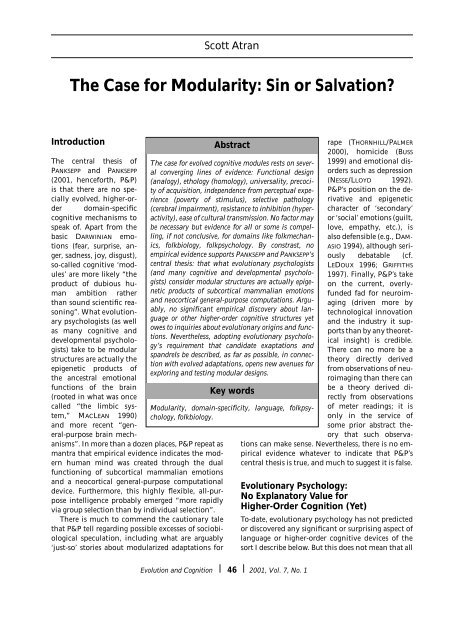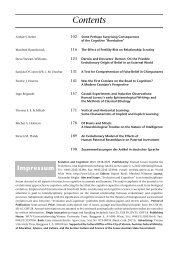Scott Atran<strong>The</strong> Case for Modularity: Sin or Salvation?Introduction<strong>The</strong> central thesis <strong>of</strong>PANKSEPP and PANKSEPP(2001, henceforth, P&P)is that there are no speciallyevolved, higher-orderdomain-specificcognitive mechanisms tospeak <strong>of</strong>. Apart from thebasic DARWINIAN emotions(fear, surprise, anger,sadness, joy, disgust),so-called cognitive ‘modules’are more likely “theproduct <strong>of</strong> dubious humanambition ratherthan sound scientific reasoning”.What evolutionarypsychologists (as wellas many cognitive anddevelopmental psychologists)take to be modularstructures are actually theepigenetic products <strong>of</strong>the ancestral emotionalfunctions <strong>of</strong> the brain(rooted in what was oncecalled “the limbic system,”MACLEAN 1990)and more recent “general-purposebrain mechanisms”.In more than a dozen places, P&P repeat asmantra that empirical evidence indicates the modernhuman mind was created through the dualfunctioning <strong>of</strong> subcortical mammalian emotionsand a neocortical general-purpose computationaldevice. Furthermore, this highly flexible, all-purposeintelligence probably emerged “more rapidlyvia group selection than by individual selection”.<strong>The</strong>re is much to commend the cautionary talethat P&P tell regarding possible excesses <strong>of</strong> sociobiologicalspeculation, including what are arguably‘just-so’ stories about modularized adaptations forAbstract<strong>The</strong> case for evolved cognitive modules rests on severalconverging lines <strong>of</strong> evidence: Functional design(analogy), ethology (homology), universality, precocity<strong>of</strong> acquisition, independence from perceptual experience(poverty <strong>of</strong> stimulus), selective pathology(cerebral impairment), resistance to inhibition (hyperactivity),ease <strong>of</strong> cultural transmission. No factor maybe necessary but evidence for all or some is compelling,if not conclusive, for domains like folkmechanics,folkbiology, folkpsychology. By constrast, noempirical evidence supports PANKSEPP and PANKSEPP’scentral thesis: that what evolutionary psychologists(and many cognitive and developmental psychologists)consider modular structures are actually epigeneticproducts <strong>of</strong> subcortical mammalian emotionsand neocortical general-purpose computations. Arguably,no significant empirical discovery about languageor other higher-order cognitive structures yetowes to inquiries about evolutionary origins and functions.Nevertheless, adopting evolutionary psychology’srequirement that candidate exaptations andspandrels be described, as far as possible, in connectionwith evolved adaptations, opens new avenues forexploring and testing modular designs.Key wordsModularity, domain-specificity, language, folkpsychology,folkbiology.Evolution and Cognition ❘ 46 ❘ 2001, Vol. 7, No. 1rape (THORNHILL/PALMER2000), homicide (BUSS1999) and emotional disorderssuch as depression(NESSE/LLOYD 1992).P&P’s position on the derivativeand epigeneticcharacter <strong>of</strong> ‘secondary’or ‘social’ emotions (guilt,love, empathy, etc.), isalso defensible (e.g., DAM-ASIO 1994), although seriouslydebatable (cf.LEDOUX 1996; GRIFFITHS1997). Finally, P&P’s takeon the current, overlyfundedfad for neuroimaging(driven more bytechnological innovationand the industry it supportsthan by any theoreticalinsight) is credible.<strong>The</strong>re can no more be atheory directly derivedfrom observations <strong>of</strong> neuroimagingthan there canbe a theory derived directlyfrom observations<strong>of</strong> meter readings; it isonly in the service <strong>of</strong>some prior abstract theorythat such observationscan make sense. Nevertheless, there is no empiricalevidence whatever to indicate that P&P’scentral thesis is true, and much to suggest it is false.<strong>Evolutionary</strong> <strong>Psychology</strong>:No Explanatory Value forHigher-Order Cognition (Yet)To-date, evolutionary psychology has not predictedor discovered any significant or surprising aspect <strong>of</strong>language or higher-order cognitive devices <strong>of</strong> thesort I describe below. But this does not mean that all
<strong>The</strong> Case for Modularity: Sin or Salvation?evolutionary psychology accounts are ‘just-so’ stories.<strong>The</strong> best account <strong>of</strong> language as an evolutionaryadaptation centers on the claim that “languageshows signs <strong>of</strong> design for the communication <strong>of</strong>propositional structures over a serial channel”(PINKER/BLOOM 1990). PINKER and BLOOM describehow specific syntactic structures conform to thislanguage-specific design in ways that provide functionaladvantage: for example, through certainstructure-dependent rules (phrase structure) andprinciples <strong>of</strong> embedding (recursion) that allow theformulation and expression <strong>of</strong> infinitely many discreteideas by finite and few means. This enables themultiple thoughts <strong>of</strong> multiple individuals to becombined, tested in imagination and consequentlyincluded or excluded from having a role in some futureaction. A population whose individuals couldcontemplate alternative scenarios in any sequenceand at any rate, benefit from the cognitive travails<strong>of</strong> others, and let conjectures die instead <strong>of</strong> themselves,would surely have had an evolutionary advantageover a population that couldn’t.PINKER and BLOOM <strong>of</strong>fer a well-reasoned and <strong>of</strong>tennonobvious analysis <strong>of</strong> evolutionary trade<strong>of</strong>fs involvedin opting for linear communication throughan auditory medium: visual displays better communicatehighly complex topological relationships (“apicture is worth a thousand words”), gestures betterconvey emotion, and language is inefficient transmittinginformation about taste or smell. For all itsinsight and plausibility, though, PINKER and BLOOM’saccount remains wholly backward-looking: nostructural discovery, novel prediction or theoreticalbreakthrough ensues within the CHOMSKYEAN frameworkthat the authors adopt.According to Jerry FODOR (1998), whose reasoningis close to CHOMSKY’s (1988, p170), it is not likely thatnatural selection gradually produced an adaptivemutation for a language instinct. Rather, selectionpressures unrelated to language simply made humanbrains a little larger and more complex. Unlike gradualand incremental adaptations, a little added complexitycan go a long way fast to produce multiplenovel structures:“Make the giraffe’s neck just a little bit longer andyou correspondingly increase, just by a little, the animal’scapacity to reach the fruit at the top <strong>of</strong> thetree… But make an ape’s brain just a little bigger (ordenser, or more folded, or, who knows, grayer) andit’s anybody’s guess what happens to the creature’sbehavioural repertoire”. (FODOR 1998).Much ink has spilled and acrimony vetted in thedebate between evolutionary psychologists and thescientists who criticize them. In the case <strong>of</strong> language,however, no empirical issue has yet to turn on thedebate. Despite very different evolutionary stories,CHOMSKY, FODOR, PINKER and BLOOM fundamentallyagree on the specific computational structures thatcharacterize language, on its innateness, on itshighly specialized mode <strong>of</strong> operation (modularity)and on the fact that all <strong>of</strong> this is uniquely the product<strong>of</strong> evolution, whether adaptation or by-product.<strong>The</strong> Language ModuleFrom a purely logical standpoint, if a mind is able totake fragmentary instances <strong>of</strong> experience (relative tothe richness and complexity <strong>of</strong> the whole data set)and spontaneously predict (project, generalize) theextension <strong>of</strong> those scattered cases to an indefinitelylarge class <strong>of</strong> intricately related cases, then the inferentialstructure responsible for this prediction cannotpossibly derive from the experience. As Humenoted, the structure must be prior to experience, justlike the cranes and architects used for constructingbuildings must exist prior to initial construction: abuilding does not just build itself. <strong>The</strong>re is no otherpossibility. What, then, are the physical possibilitiesfor a mental structure to be “prior to experience”?One could hold with SOCRATES or BUDDHA thatpeople are born with a past-life ‘memory’ for thestructure <strong>of</strong> experience they will encounter later inlife; or, one could hold with Thomas AQUINAS or ImmanuelKANT that God put structure in people’sminds. If, however, one accepts humans as biologicalcreatures whose species attributes emergedthrough the same evolutionary processes that governthe emergence <strong>of</strong> all other species, then thereappears to be no alternative to a priori mental structuresbeing evolved biological structures (whether asadaptations or by-products <strong>of</strong> adaptations). To sayan evolved biological structure is ‘innate’ is not tosay that every important aspect <strong>of</strong> its phenotypicexpression is ‘genetically determined’. Biologicallypoised structures channel development, but do notdetermine it—like mountains that channel scatteredrain into the same mountain–valley river basin(WADDINGTON 1959).P&P might grant all this, but argue that an allpurpose,domain-general computational device sufficesto give the mind/brain inferential power beyondthe information given. As an empirical claim,this entails that one should be able to deduce thestructural principles and parameters governing anyspecific domain from general purpose-structures actingunder the constraints <strong>of</strong> experience in the rele-Evolution and Cognition ❘ 47 ❘ 2001, Vol. 7, No. 1








